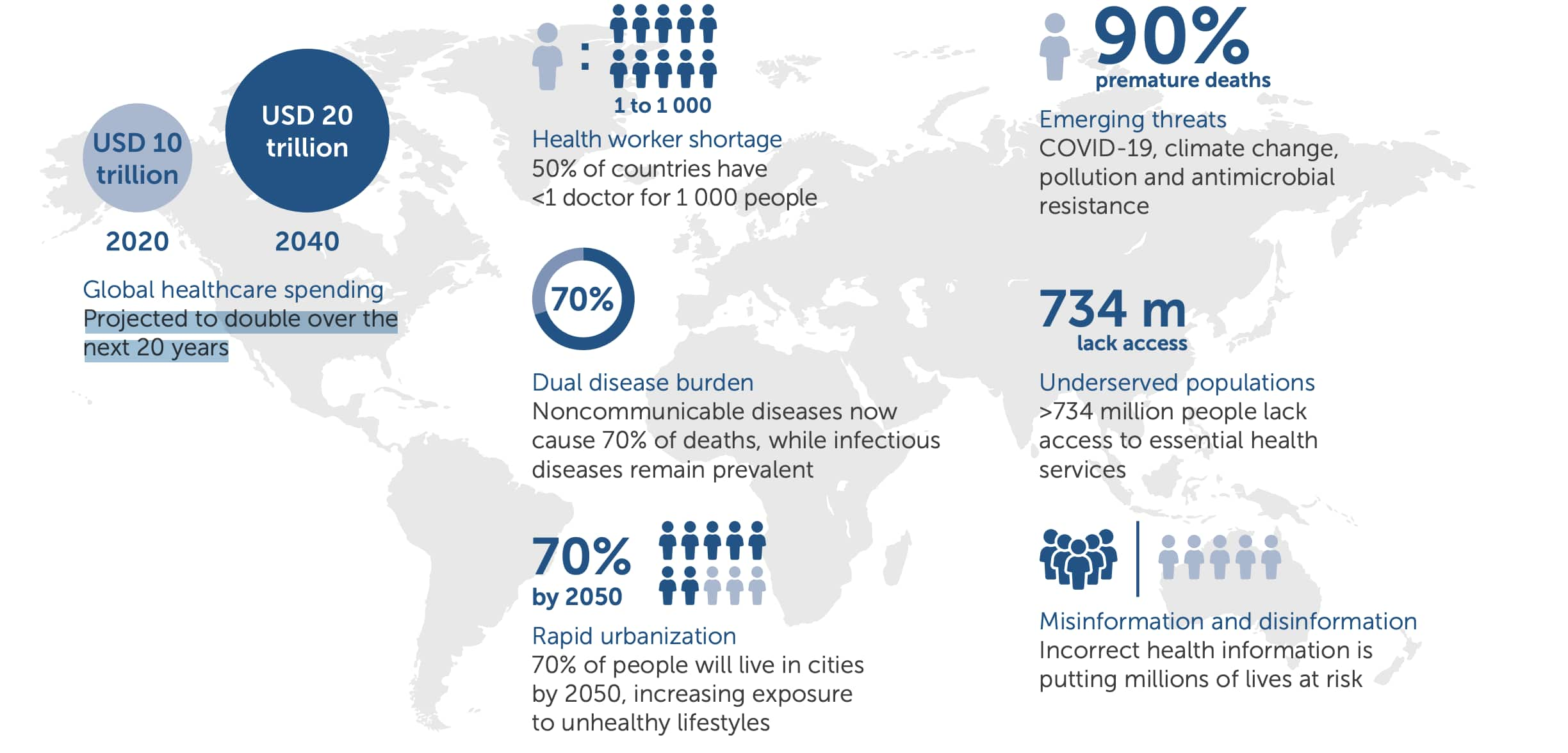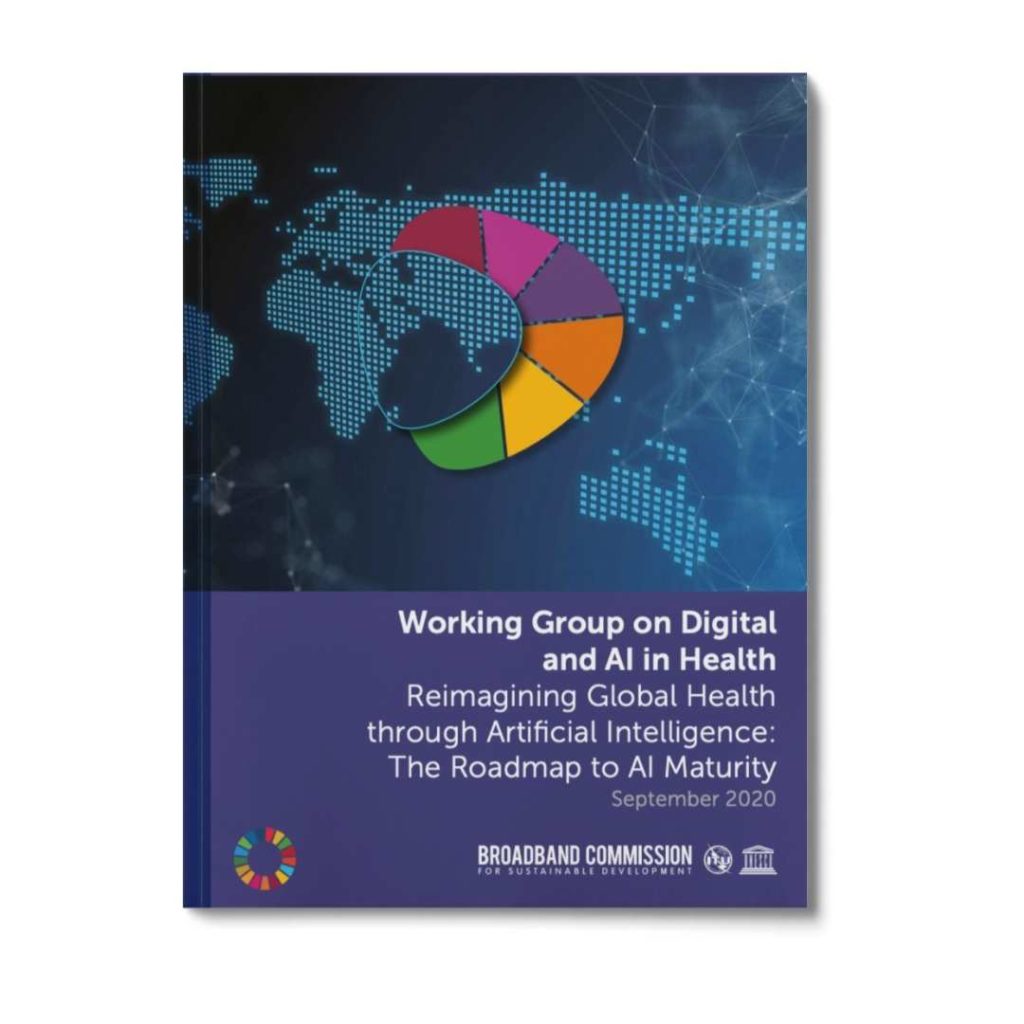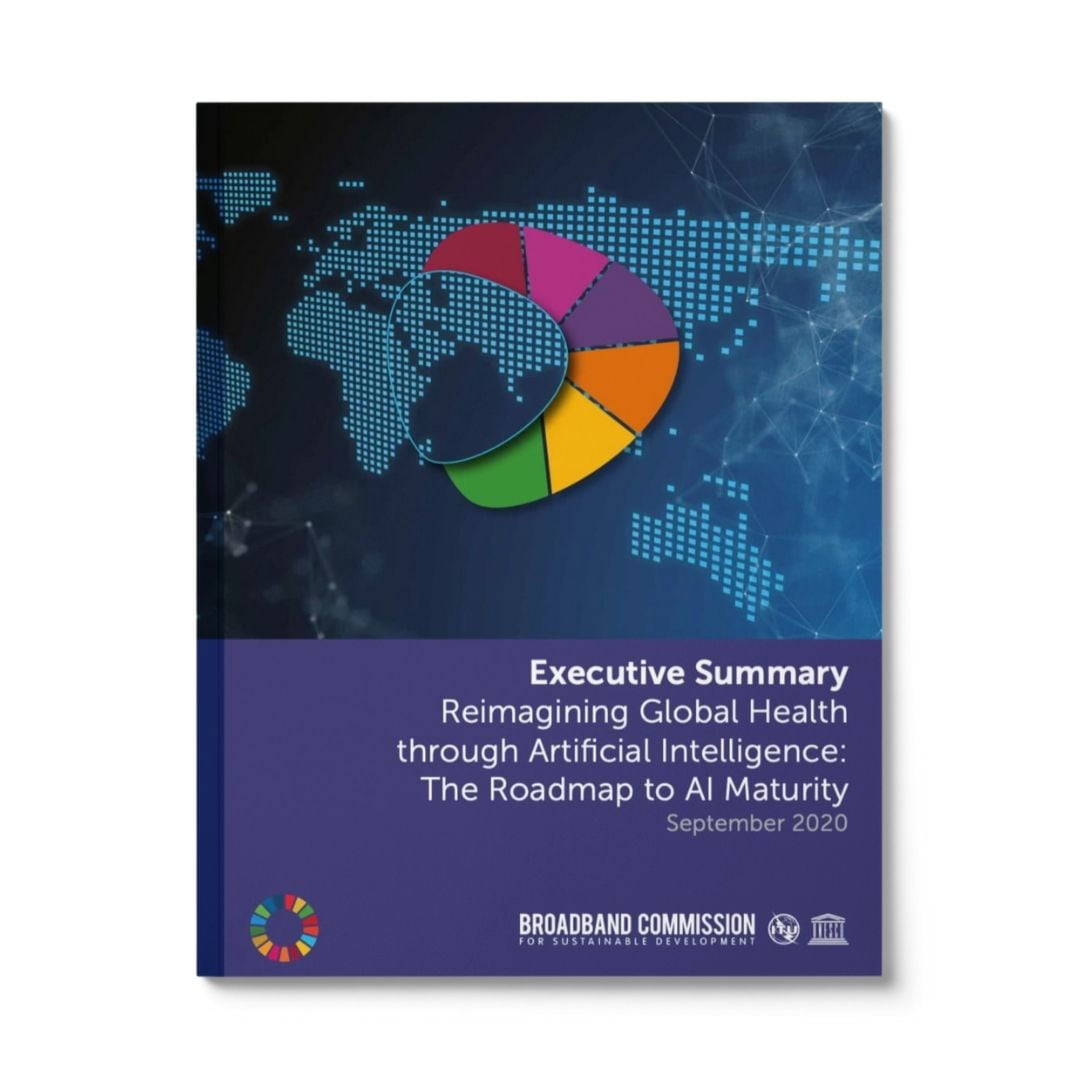How can we expand access to healthcare by integrating AI-enabled tools into the delivery of services?
The Broadband Commission Working Group on Digital and AI in Health was launched to examine the challenges, lessons learned and best practices for AI solutions and to provide actionable recommendations for all stakeholders to realize the full potential of AI in healthcare. Co-chaired by Dr. Ann Aerts, head of the Novartis Foundation and Mr. Paul Mitchell, Senior Director of Technology Policy and Internet Governance of the Microsoft Corporation, the Working Group’s 2020 report calls for global action to create meaningful legislation and robust policy frameworks that build and incentivize an AI-enabling environment in healthcare, especially in low- and middle-income countries (LMICs).
Setting the Stage
The Case for AI in Health
Artificial intelligence is today’s defining technology, and greatest opportunity to address growing challenges, including rising healthcare costs, demographic and epidemiological shifts, unmet health needs related to the dual burden from infectious and noncommunicable diseases (NCDs), and a significant shortage of skilled health professionals, particularly in LMICs.

The case for AI in health is rooted in health and social benefits. The global community has the opportunity to actively re-engineer health systems by reimagining how digital and AI capabilities can strengthen health and care delivery. This is particularly relevant for leaders in LMICs, given the potential to address the specific needs of diverse LMIC populations.
AI Has Moved Beyond the Hype: What Business Leaders Think
84%
C-suite executives believe they must leverage AI to achieve growth.
93%
agree that AI helps achieve previously hidden or unobtainable value.
86%
agree that AI is finding solutions to previously unsolved business problems.
The Way Forward
Findings and Recommendations
Top 5 Use Cases for AI in Health
The Working Group’s outcome document, Reimagining Global Health Through Artificial Intelligence: The Roadmap to AI Maturity, identifies five top use cases for how AI is applied in health to address global and public health priorities, strengthen health systems, and improve outcomes for patients. The current examples speak to health as a biomedical paradigm, however, as the systems paradigm of global health expands, AI tools also begin to address health by factoring in more complex, system-related features of health, such as the fact that most diseases are inseparable from poverty, inequalities, stigma, and social disadvantage and environmental and climate factors.
Targeting public health interventions through predictive analytics.
Optimizing drug discovery and design, personalized therapy, and trial design and execution
Integrating into new and existing clinical workflows.
Interacting directly with patients, providing nonclinical therapies, information and advice.
Optimizing backend processes in healthcare.
The report calls for global action to create meaningful legislation and robust policy frameworks that build and incentivize an AI-enabling environment, especially in Low- and Middle- Income Countries (LMICs). Find below the six areas that have been identified as critical for countries to progress towards AI maturity, and the corresponding actionable recommendations.

- Strengthen national DSAI (Data Science and AI) capabilities and integrate AI solutions in health
- Integrate AI solutions into health workflows through appropriate change management
- Integrate agile methodologies and human-centric design as transversal methods into health system workflows and educational offerings
- Define national goals for AI innovation to center around priority health burdens and health system gaps.
- Co-create and implement authoritative standards for interoperability and draft consent-driven guidelines for their appropriate implementation in healthcare.
- Draft legislation on security and privacy standards and implement best practices across the healthcare value chain
- Define a national implementation roadmap for progressing on the maturity curve for AI in health. This should include all relevant stakeholders, outline governance –including roles and responsibilities – and foster both government and private sector actions
- Develop clear policies, guidelines, and white-papers to empower strong data and AI stewardship, establish accountability mechanisms, and champion data as a public health asset
- Integrate fundamental rights (e.g., rights to non-discrimination and equality), regulatory restrictions (e.g., GDPR, HIPAA), and privacy into legislative frameworks and health system governance
- Asses needs and opportunities for implementing AI solutions that can strengthen health systems
- Establish human in-the-loop and localization as standard practice for AI in health solution development, deployment, and continuous improvement
- Define KPIs for monitoring and assessing the scalability of AI solutions across different levels and use cases for health and care
- Ministries and industry leaders prioritize and support AI as a tool to improve health and care delivery and strengthen health systems
- PPPs focus on the public purpose of improving health, and coordinate efforts to avoid fragmentation while minimizing the complexity and bureaucracy of partnership operations
- Establish an organizational innovation umbrella to counter fragmentation, such as an innovation park or framework that is aligned to public health priorities and donor interests. A forum for stakeholder discussions and coordination is also established
- Create, simplify, and promote incentive structures for AI solutions that address public health priorities or strengthen the health system, such as tax benefits, tax immunity, government grants, in-kind benefits, and other benefits
- Cultivate an active and broad network of donors and funders that is easily accessible to innovators and startups
- Develop and support sustainable monetization strategies that are aligned with public health priorities and also privacy-compliant
Download the full report to access actionable recommendations tailored to individual stakeholder groups, enabling governments, health organizations, civil society, the private sector and others.
The Working Group Model
Composition and Activities
Dr. Ann Aerts
Head, Novartis Foundation
Mr. Paul Mitchell
Senior Director of Technology Policy and Internet Governance, Microsoft Corporation
Co-Chairs: Dr. Ann Aerts, Paul Mitchell
- Bocar Ba, Samena Telecommunications Council
- Kevin Martin, Facebook
- Carlos Jarque, America Movil
- Hans Vestberg, Verizon
- Stella Ndabeni-Abrahams, South Africa
- Dato Ir. Lee Yee Cheong, Malaysia
- Baroness Beeban Kidron, 5Rights
- Fekitamoela Utoikamanu, UN-OHRLLS
- Amir Dossal, Global Partnerships
- Tedros Adhanom Ghebreyesus, WHO
- Henrietta Fore, UNICEF
- Robert Kirkpatrick, UN Global Pulse
- Amani Abou-Zeid, African Union
- Makhtar Diop, The World Bank
- ITU
- PATH
- AeHIN
- IntraHealth
- Geneva Graduate Institute
- Accenture
- Bill & Melinda Gates Foundation
- Columbia University Mailman School of Public Health
- MIT Media Lab
- AI4Health Focus Group ITU/ WHO
- AdaHealth
- USAID
- Rockfeller Foundation
- Massachusetts Institute of Technology
The Group was launched in April 2019 during the Broadband Commission’s Annual Spring Meeting, and held its kick off call on 21 September 2019 in NYC. It is the 3rd work-stream of the Commission around the theme of digital health, proposed with the vision of generating knowledge on successes, challenges, and learnings from AI solutions in health. It builds on the previous work of the Working Group on Digital Health and the Working Group on Digital Health and NCDs.
Stay engaged with the report
Click the icon to download the promotional toolkit for access to social copy, graphics, key messages, and more.
Focus Area
Outcome Resources
Co-Chairs
Dr. Ann Aerts
Head, Novartis Foundation
&
Mr. Paul Mitchell
Senior Director of Technology Policy and Internet Governance, Microsoft Corporation
Broadband Advocacy Targets
SDGs










